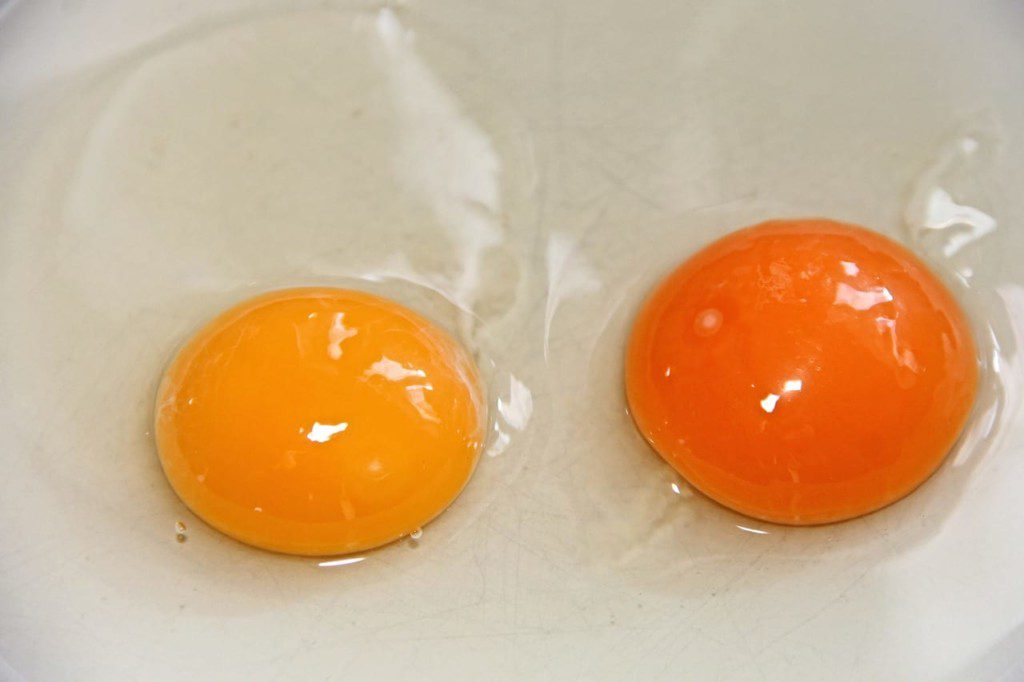Eggs have always been deemed as the best source of protein. Protein is one very essential nutrient that your body just can’t function without. Protein is constantly working to help your cells and tissues build or repair themselves. Protein is also necessary for proper hormone production, enzyme production and it is the building component of bones, muscles, and blood.
Eggs are the richest source of proteins. On average, an egg can provide about 6-7 grams of protein. For an individual who practices a sedentary lifestyle, the daily protein requirement for a male would be about 56 grams and for a female would be about 46 grams. This would equate to consuming around 6-9 eggs per day.
Table of Contents
How Much Protein Does an Egg Contain?
The amount of protein present in an egg depends on the size of the egg too. Smaller eggs tend to contain lower amounts of proteins and larger eggs contain more proteins. In a nutshell, the amount of protein in an egg can vary depending on the size of the egg, anywhere between 5-8 grams.
It is a well-known fact that egg whites contain mostly proteins. This has lead to the misconception that only egg whites contain proteins and not the yolk. However, along with other necessary nutrients, yolks contain about 50% of the protein in an egg. If only the egg white is consumed, then you only get half of the proteins in the egg. The best part about including eggs into your diet is that you don’t have to stick to just one or two ways of cooking them and explore and experiment with many ways of cooking eggs.
Will Eating Raw Eggs Give More Proteins?

Another popular misconception is that eating raw eggs gives more proteins than when the eggs are cooked. In reality, eggs are packed with high-quality proteins but the amount of proteins available for the body to use depends on the way the egg is cooked.
Also Read: Protein Rich Food For An Indian-Vegetarian Diet: 10 Food Items Rich In Protein +Recipes
It is difficult for the body to absorb proteins in uncooked eggs. Only about 50% of the proteins in eggs (raw) can be absorbed by the body. Additionally, raw eggs or bad eggs can be carriers of unwanted bacteria such as Salmonella and E.coli which can drastically affect your health.
The body can absorb up to 90% of the proteins in an egg that is cooked. This further proves that cooking the eggs makes the proteins in eggs more accessible and digestible in the body. To get the most out of your egg, cooking it well is absolutely necessary. It is not only a healthier option, but it is also a safer option since cooking will help get rid of unwanted bacteria.
How many eggs can you eat in a day?
Now that you know eggs are packed with proteins, you would think eating more eggs in a day is a good idea. It is important to note that eggs also contain high-density lipoproteins a.k.a, the good cholesterol. Numerous studies have shown that regular consumption of eggs has positive effects on the body, mainly on heart health.

However, all of these studies have kept egg consumption limits to three per day. There has been little research to check the effect of eating more than three eggs per day. This leads us to believe that eating up to three eggs a day is safe. Any more than that is not advisable since there are no credible results to predict the outcome.
Ways to Cook Eggs
Now that we’ve established that eating cooked eggs is better for protein absorption, here are a few ways you can cook your eggs to get the protein in eggs-
Scrambled Eggs

This is the perfect way to cook eggs for when you are in a hurry. Perfectly cooked eggs can be made in minutes and you’re good to go for the rest of the morning.
Calories in Scrambled Eggs= 91
Omelet

Omelettes are the best alternatives to scrambled eggs, especially if you want something more filling. You can even enrich your omelette with vegetables like onions, tomatoes, spinach, and mushrooms to make it more healthy and appetizing.
Calories in Omelette= 108
Boiled Eggs

Boiled eggs are simple. All you need to do is place the eggs in boiling water for a few minutes. If you have an electric egg boiler, then your work gets even easier.
Number of calories in a boiled egg= 78
Deviled Eggs

Deviled eggs are a fun take on the regular boiled eggs. Boiled egg yolk is mashed and flavored with herbs and spices and then refilled in the egg whites. These are usually served as appetizers in parties and is one of the tastiest ways to get to the proteins in eggs.
Calories in Deviled Eggs= 98
Poached Eggs

Poaching eggs is yet another classic way of cooking eggs. However, in poached eggs the yolks tend to be uncooked or raw, making protein absorption from the eggs more difficult.
Calories in Poached Eggs= 72
Eggs are a very good source of nutrients. They are full of good cholesterol and also seem to aid weight loss. They are easily available and take very work to prepare and consume. They are one of nature’s best sources of protein and to take complete advantage of this source. Protein in eggs is more accessible and easier to be absorbed into the body if it is cooked well.
Frequently Asked Questions
Here are some interesting FAQs on the power of protein in eggs:
1. Why is protein in eggs considered powerful?
Protein in eggs is considered powerful because it is a complete protein source, meaning it contains all nine essential amino acids necessary for human health. These amino acids are crucial for various bodily functions, including muscle repair, immune function, and hormone regulation.
2. How much protein is in an egg?
On average, a large egg contains about 6-7 grams of protein. However, this amount can vary slightly depending on the size of the egg. The protein is primarily found in the egg white, with a smaller amount present in the yolk.
3. Is the protein in eggs easily digestible?
Yes, the protein in eggs is highly digestible, making it an excellent choice for people of all ages, including infants and the elderly. The proteins in eggs are easily broken down and absorbed by the body, ensuring efficient utilization for various bodily functions.
4. Can eggs help with weight management due to their protein content?
Yes, eggs can be beneficial for weight management due to their high protein content. Protein is known to increase feelings of fullness and reduce appetite, which can lead to fewer calories consumed throughout the day. Incorporating eggs into meals can help support weight loss or weight maintenance efforts.
5. Are there any other health benefits associated with the protein in eggs?
In addition to being a rich source of protein, eggs also provide various vitamins and minerals essential for overall health. They are particularly high in nutrients like vitamin B12, selenium, and choline, which play important roles in metabolism, brain function, and cardiovascular health. Consuming eggs as part of a balanced diet can contribute to overall well-being.


